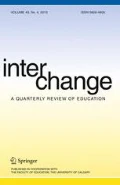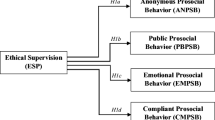Abstract
Archetypal psychology suggests the possibility of a punishment archetype representing the unconscious preferences of human beings as a species about what constitutes appropriate ways for leaders (students, teachers and educational leaders) to correct followers who do harm to others. Mythological analysis compared God’s process of punishment, in the Abraham myth, with the theories of Scheler (1973), Kierkegaard (1987) and modern management theory about punishment. While modern theory focused on a contingent tit-for-tat relationship between doing harm and reprisal for it, God used punishment and forgiveness to reestablish effective moral relationships between the harm-doer and the harmed persons. God always forgave harm done to himself, and generally punished harm done to others but then forgave unilaterally, without waiting for Abraham to improve. If students and educators are unconsciously predisposed to expect that punishment is a long term educational activity intended to allow the harm-doer to atone, repent and re-establish effective working relationships with harmed persons, then the focus of modern punishment theory on intimidation will be ineffective and generate unconscious resistance.
Similar content being viewed by others
References
Abramson N.R. (2007) The leadership archetype: A Jungian analysis of similarities between modern leadership theory and the Abraham myth in the Judaic-Christian tradition. Journal o f Business Ethics 72: 115–129
Andreoti J., Harbaugh W., Vesterland L. (2003) The carrot or the stick: Rewards, punishment and cooperation. American Economic Review 93(3): 893–902
Arvey R.D., Ivancevich J.M. (1980) Punishment in organizations: A review, propositions, and research suggestions. Academy of Management Review 5(1): 123–132
Brown D.E. (1991) Human universals. McGraw Hill, New York
Campbell J. (1973) The hero with a thousand faces. Princeton University Press, Princeton, NJ
Casseri M. (2005) On the design of peer punishment experiments. Experimental Economics 8: 1–9
Corrigan P. (1999) Shakespeare on management: Leadership lessons for today’s managers. London, UK, Kogan Page
Cosmides L., Tooby J. (1992) Cognitive adaptations for social exchange. In: Barkow J.H., Cosmides L., Tooby J.(eds) The adapted mind: Evolutionary psychology and the gneration of culture. Oxford University Press, New York
Eid M., Riemann R., Angleitner A., Borkenau P. (2003) Sociability and positive emotionality: Genetic and environmental contributions to the covariation between different facets of extraversion. Journal of Personality 71(3): 319–346
Ehrlich P.R. (2000) Human natures: Genes, cultures and the human nature. Penguin, New York
Fehr E., Gachter S. (2000) Cooperation and punishment in public goods experiment. The American Economic Review 90(4): 980–994
Fox R. (1975) Encounter with anthropology. London, UK, Peregrine
Giorgi A. (2003) Phenomenology and psychological research. Duquesne University, Pittsburgh, PA
Hamer D. (2004) The God gene: How faith is hardwired into our genes. Anchor, New York
Hegel G.F. (1977) Phenomenology of spirit. Oxford University Press, Oxford, UK
Hopcke R.H. (1999) A guided tour of the collected works of C.G. Jung. Shambala, Boston, MA
Husserl, E. (2000). Logical investigations, Vol. 2. New York: Humanity.
Jung C.G. (2002) Answer to Job. (Fiftieth anniversary edition.). Princeton University Press, Princeton
Jung, C.G. (1977). The collected works of C.G. Jung, Volume 9: The archetypes and the collective unconscious. Princeton, NJ: Princeton University Press.
Jung C.G., Jung C.G. (1972) Two essays on analytical psychology (2nd ed). Princeton University Press, Princeton, NJ
Kant I. (1998). Critique of pure reason (P. Guyer, & A.W. Wood, Trans.). Cambridge, UK: Cambridge University Press.
Kazadin A.E. (1975) Behaviour modification in applied settings. Dorsey, Homewood
Ketsde Vries M. (1995) Organizational paradoxes: Clinical approaches to management. London, UK, Routledge
Ketsde Vries M. (2001) The leadership mystique: A user’s manual for the human enterprise. Financial Times Prentice Hall, London, UK
Kierkegaard S. (1941) For self-examination and judge for yourselves and three discourses. Princeton University Press, Princeton, NJ
Kierkegaard S. (2005) Fear and trembling (A Hannay, Trans.). Penguin, London, UK
Kierkegaard S. (1987) Either/or (H.V. Hong & S. H. Hong, Trans.). Princeton University Press, Princeton, NY
Krueger R.F., Markon K.E., Bouchard T.J. Jr. (2003) The extended genotype: The heritability of personality accounts for the heritability of recalled family environments in twins reared apart. Journal of Personality 71(5): 809–833
Lumsden C.J., Wilson E.O. (1981) Genes, minds and culture. Harvard University Press, Cambridge, MA
Mullen J.D. (1981) Kierkegaard’s philosophy. New American Library, New York
Murdock G.P. (1945) The common denominator of culture. In: Linden R.(eds) The science of man in the world crisis. Columbia University Press, New York
Neumann E. (1974) The great Mother: An analysis of the archetype. Princeton University Press, Princeton, NJ
O’Neill J. (1995) The poverty of postmodernism. Routledge, London, UK
Peterson G.R. (2003) Minding God: Theology and the cognitive sciences. Minneapolis, Fortress
Pickett, J.P. (eds) (2000) The American heritage dictionary of the English language (4th ed). Houghton Mifflin, Boston, MA
Rosenberg, D. (2006). Abraham: The first historical biography. New York; Basic.
Scheler M. (1973) Formalism in ethics and non-formal ethics of values. Northwestern University, Evanston, IL
Segal, R.A. (2004). Myth: A very short introduction. Oxford, UK: Oxford University Press.
Senyshyn Y. (1998) Kierkegaardian implications of punishment, guilt, and forgiveness for education. Interchange 29(4): 425–437
Sharp, D. (1998). Jungian psychology unplugged. Toronto, ON: Inner City.
Sievers B. (1996) Greek mythology as means of organizational analysis: The battle of Larkfield. Leadership and Organization Development Journal 17(6): 32–40
Spinelli E. (2005) The interpreted world: An introduction to phenomenological psychology (2nd ed). Sage, London, UK
Stein M. (1998) Jung’s map of the soul: An introduction. Open Court, Chicago IL
Stein M. (2005) The Othelo conundrum: The inner contagion of leadership. Organization Studies 26(9): 1405–1419
Stevens A. (2003) Archetype revisited: An updated natural history of the self. Inner City Books, Toronto, ON
Suggs M.J., Sakenfeld K.B., Mueller J.R. (1992) The Oxford study Bible: Revised English Bible with the apocrypha. Oxford University, New York
Tinbergen N. (1951) The study of instinct. Oxford University Press, London, UK
Tyler T.R., Blader S.L. (2005) Can businesses effectively regulate employee conduct? The antecedents of rule following in work settings. Academy of Management Journal 48(6): 1143–1158
Velarde-Mayol V. (2000) OnHusserl. Wadsworth Thompson Learning, Belmont, CA
Waddington C.H. (1957) The strategy of the genes: A discussion of Some aspects of theoretical biology. George Allen & Unwin, London UK
Walker S.F. (2002) Jung and the Jungians on myth: An introduction. Routledge, New York
Weick K. (1979) The social psychology of organizing. Addison-Wesley, Reading, MA
Wilson, E.O. (1975). Sociobiology: The new synthesis. Cambridge, MA: Harvard University Press
Winstanley D. (2004) Phaethon: Seizing the reins of power. In: Gabriel Y.(eds) Myths, stories and organizations: Premodern narratives for our times. Oxford University Press, Oxford, UK
Wittgenstein, L. (1945-1947). Remarks on the philosophy of psychology. London, UK: Blackwell.
Author information
Authors and Affiliations
Corresponding author
Rights and permissions
About this article
Cite this article
Abramson, N.R., Senyshyn, Y. Punishment and Forgiveness: A Phenomenological Analysis of Archetypal Leadership Patterns and the Implications for Educational Practice. Interchange 40, 373–402 (2009). https://doi.org/10.1007/s10780-009-9101-8
Published:
Issue Date:
DOI: https://doi.org/10.1007/s10780-009-9101-8




